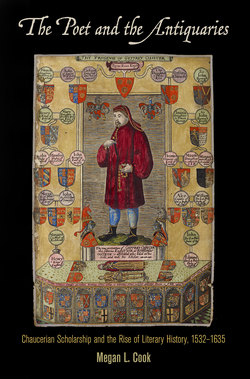The Poet and the Antiquaries

Реклама. ООО «ЛитРес», ИНН: 7719571260.
Оглавление
Megan L. Cook. The Poet and the Antiquaries
Отрывок из книги
THE POET AND THE ANTIQUARIES
Chaucerian Scholarship and the Rise of Literary History, 1532–1635
.....
Through their broad and varied efforts, early modern scholars played an indispensable role in constructing Chaucer as a poet whose writing both embodies his historical moment and transcends it. As Chaucer’s life and works were redefined as subjects for scholarly as well as readerly attention in early modern England, they were inscribed as part of a shared English heritage. At the same time, through a new emphasis on the historical distance of the pre-Reformation past, they were increasingly marked as antecedent to contemporary literary culture. The Poet and the Antiquaries shows how antiquarian commentary not only reflected this dialectic but fueled it, transforming Chaucer into a synecdoche not just for earlier poetry but for wideranging linguistic, religious, and political dimensions of the English past. The significance granted to Chaucer by these materials extended that influence beyond the poetic realm, shaping the terms in which English nationhood found its cultural voice and making not just Chaucer but commentary upon him absolutely central to Renaissance ways of knowing the medieval.
Approached with this wider bibliographical and historical framework in mind, the Reader’s claim in the poem by H.B. with which I began may seem a bit disingenuous. Far from being “unknown” to early modern readers, Chaucer was a versatile figure who stood in for an intricate set of relations between past and present. Moreover, he was known not “only by [his] books,” but through a web of comment and commentary that, yes, included the impressive folio editions, but which also ranged from erudite national history to popular poetry and drama. In each of these contexts, Chaucer mattered both because of and in spite of his historical distance from the present. By reading Chaucer in an expanded archive, the following chapters show that Chaucer’s status in early modern England depended not just on ongoing enthusiasm for his poetry but on the intertwining and reintertwining of national and literary concerns over a period of several decades. This phenomenon, of course, is not unique to Chaucer in the Renaissance: rather, it is exemplary of the manner in which the literature of the past and the politics of the present speak to one another in surprising and sometimes urgent ways.
.....